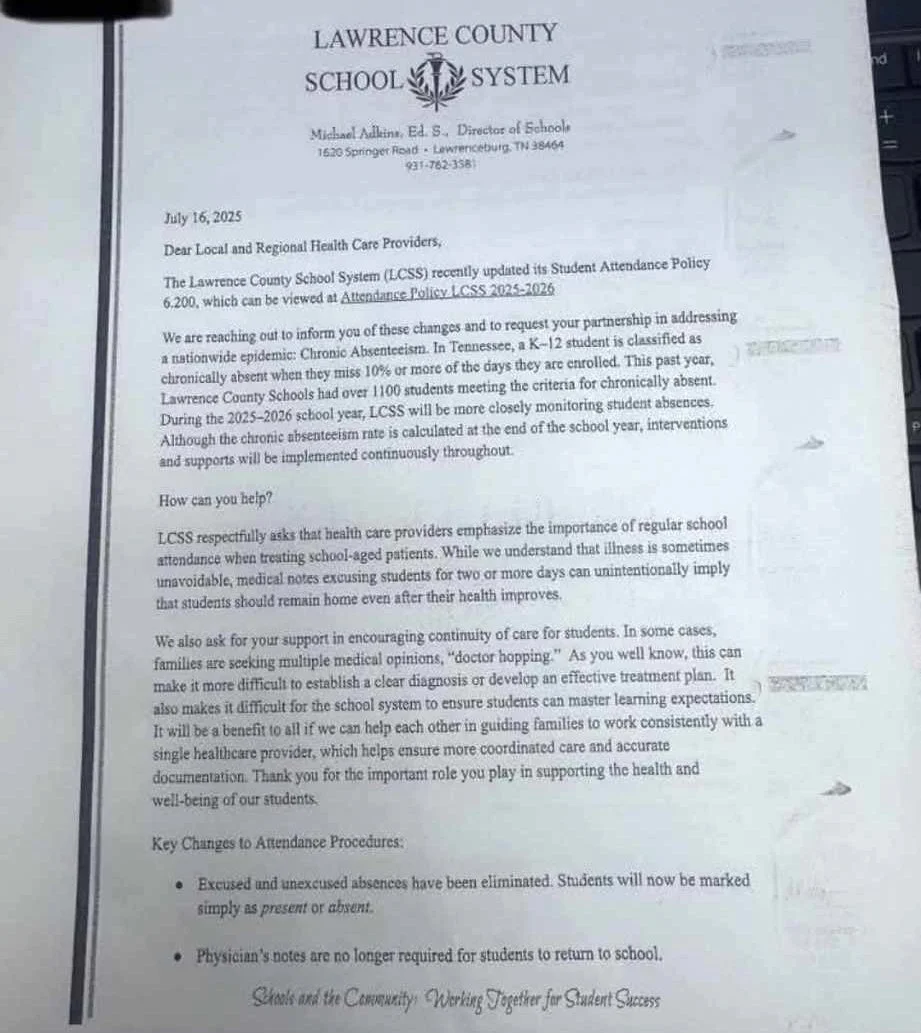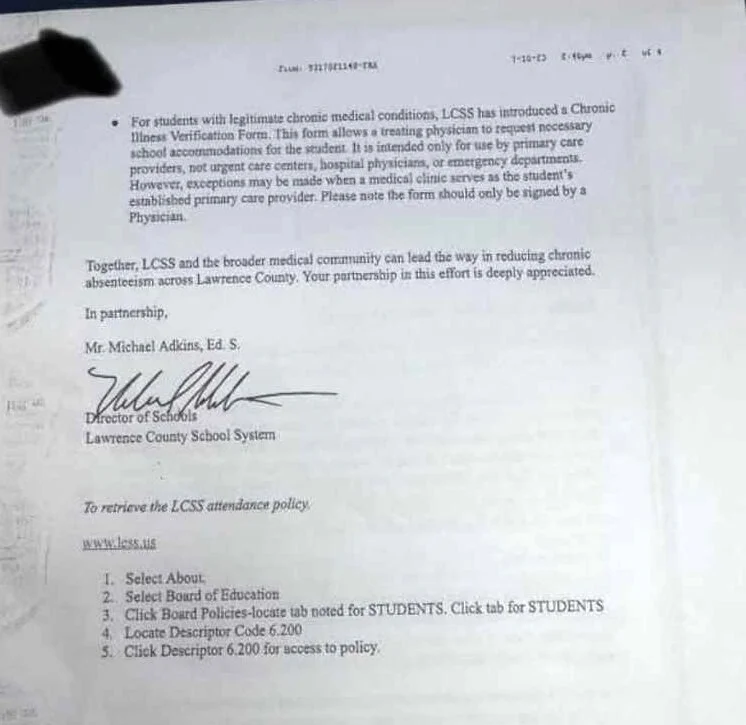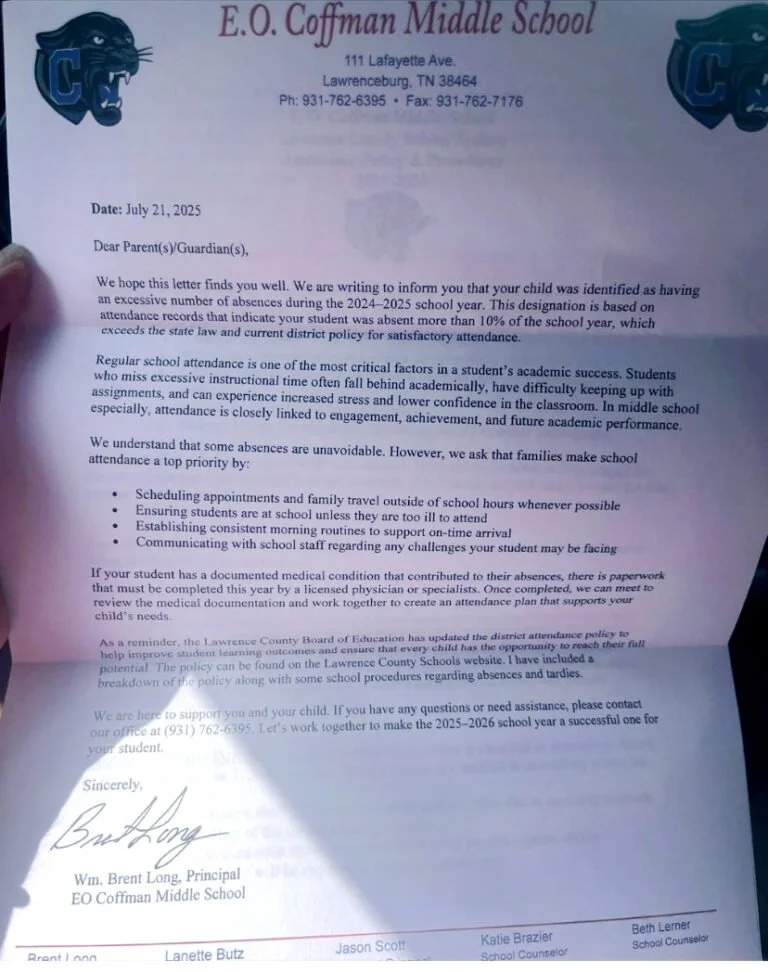Government Schools Now Trying to Get Involved in Children’s Healthcare
Yes, even in small towns the government is attempting to usurp parental rights. In the small town of Lawrenceburg, Tennessee (population ~12,000) the local school board unveiled its new attendance policy, sending shock waves through the community.
A resident of this neighboring community reached out to me in an attempt to bring attention to this alarming development long before it made national news.
Lawrence County Director of Schools Michael Adkins sent a letter addressed to local and regional healthcare providers, informing them of the new attendance policy and accusing parents of “doctor hopping.” Adkins encouraged healthcare providers to “guide families to work with a single healthcare provider.” He expressed how a partnership with Lawrence County schools would be greatly appreciated.
In what country are we living when a director of schools feels it is his right to contact medical providers regarding the private healthcare treatment of children? Was this an attempt by a government employee to direct the medical care of children in his district? Children do not belong to the state.
Additionally, Lawrence County Schools provides Chronic Illness Verification forms which clearly outline that the information may be used in court proceedings and that by signing the form, parents are waiving their child’s right to HIPPA.
I am not sure how much more clear it needs to be to parents that the government aims to remove the parents from the equation and that total control of your child is the goal.
In 2024 the Tennessee legislature passed bill SB 2820/HB2922, which Free YOUR Children staunchly opposed, this bill established “Opportunity Boarding Charter Schools” for at-risk children. Did you know that one of the identifiers for being eligible for these charters is “the student is chronically absent, as defined in Tennessee’s Every Student Succeeds Act (ESSA) plan established pursuant to the Every Student Succeeds Act”?
Let’s be clear, these schools are places where children will reside. Yes, you read that right. They will live there. How did your legislator vote?
What parents may not realize is that this is a nationwide push.
“The U.S. Department of Education (2022) strategic plan includes an objective to ‘[s]upport the development and implementation of multi-tiered systems of supports to increase students’ engagement; social, emotional, and mental health; well-being; and academic success’ (see the 2022-2026 Strategic Plan, p. 44),” according to the Integrated Multi-Tiered Systems of Support Research Network.
FINANCIAL INCENTIVE
Chronic absenteeism affects funding for schools. According to Tennessee Investment in Student Achievement (TISA), “The TISA formula uses Average Daily Membership (ADM) to calculate student counts for most funding elements. Rather than measuring raw numbers of students, ADM accounts for each student’s enrollment and daily class schedule across nine reporting periods throughout the year. Each reporting period covers approximately 20 instructional days based on the LEA’s school calendar.”
When a student is absent from class, it lowers the Average Daily Membership, which affects the amount of funding a district can receive. In addition, schools can also apply for grants from the Department of Education that focus on attendance.
From the U.S. Department of Education:
Title I, Part A funds may be used on evidence-based strategies to increase attendance and instructional time. [All 12 schools in Lawrence County are receiving Title I funding]
Title II, Part A funds may be used by schools to implement evidence-based professional development programming, focused on increasing student engagement.
Title IV, Part A funds may be used to improve school conditions and create safe, positive, and healthy learning environments that support consistent student attendance.
Title IV, Part B (Nita M. Lowey 21st Century Community Learning Centers) funds may be used to provide out-of-school time opportunities (such as enrichment programs before school, after school, and during school breaks) to enhance connections between students and their school, family, and community partners and encourage everyday attendance.
Title IV, Part E funds may be used to strengthen family engagement, which in turn promotes daily student attendance.
IDEA Part B funds may be used to support schools to compensate for lost instructional time due to chronic absenteeism of children with disabilities.
Stronger Connections Grant program, authorized under the Bipartisan Safer Communities Act, provides funding to high-needs schools that may create safe, welcoming environments and foster regular school attendance.
Discretionary Grants to Support Attendance
School systems can apply for federal funding from a number of discretionary grant programs to promote student engagement and everyday attendance.
Full-Service Community Schools provide wraparound supports and can provide learning acceleration opportunities.
Promise Neighborhoods provide comprehensive cradle-to-career supports to students in low-income neighborhoods.
The Comprehensive Literacy State Development Grant advances literacy skills through evidence-based practices, activities, and interventions for high-need schools.
The Innovative Approaches to Literacy Grant promotes innovative literacy programs and ensures students have access to high-quality literacy opportunities and resources.
The Education Innovation and Research program provides funding to promote innovative programs that improve student achievement, including programs districts created with ESSER funds.
___
School attendance is also an avenue of control the state is using to trap parents in the juvenile court pipeline. We have seen it unfold already in the state of Tennessee and the Pulse reported on it.
Some of you may remember when we were in the Coffee County Juvenile Justice Center and watched as parents were being threatened with having their children sent away over alleged truancy charges, and Judge Ewell was demanding that they re-enroll their children in public schools?
The state of Tennessee has adopted the MTSS (Multi-Tiered Systems of Support) which they have implemented statewide. The state clearly outlines that “The school team should review all available data from Tiers I and II (if applicable), including but not limited to truancy.”
I have been watching parents react to this new Lawrenceburg policy. Unfortunately, many believe that they will be able to change the attendance policy by simply protesting or speaking at a board meeting. They are failing to understand the true trajectory of what is happening in education and the agenda behind it.
Advice regarding not signing forms or opting out of specific programs, while well meaning, may sound like a way to avoid the consequences of giving the state access to your children, but you are not protected.
The only definite way to protect your children is by removing them from the very system that believes it has a right to influence your child’s medical care. Parents in Lawrence County have a decision to make. The only person standing between complete government control over your children is you. Are parents going to co-parent with the government or are they going to take full responsibility and control over their child’s education?



